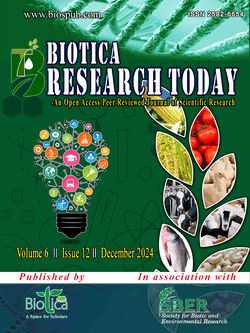
Conservation of Horseshoe Crab: Ecological Importance and Sustainability Challenges
Thejaswini*
ICAR-CIFE Rohtak Centre, Anwal, Haryana (124 411), India
Susitharan V.
ICAR-CIFE Rohtak Centre, Anwal, Haryana (124 411), India
Nagaraja P.S.
ICAR-CIFE Rohtak Centre, Anwal, Haryana (124 411), India
Raghul Ravi
ICAR-CIFE Rohtak Centre, Anwal, Haryana (124 411), India
Ishwar Chandra
ICAR-CIFE Rohtak Centre, Anwal, Haryana (124 411), India
Priyanka Sanwal
ICAR-CIFE Rohtak Centre, Anwal, Haryana (124 411), India
Anjali Kumari
ICAR-CIFE Rohtak Centre, Anwal, Haryana (124 411), India
DOI: NIL
Keywords: Bioindicator, Bycatch, Conservation, Horseshoe crab
Abstract
The horseshoe crab is an ancient marine arthropod that plays a major role in a marine environment and is a bioindicator. Apart from this, it has major demand in the biomedical field. It also indirectly helps migratory birds, ecotourism and education. Unfortunately, they are now in an extinct phase due to activities including habitat destruction, overharvesting, climate change and bycatch. In India, their population is mainly reduced due to bycatch and climate. The conservation efforts are done to protect them and their culture technology is underway.
Downloads
not found
Reference
John, B.A., Nelson, B.R., Sheikh, H.I., Cheung, S.G., Wardiatno, Y., Dash, B.P., Tsuchiya, K., Iwasaki, Y., Pati, S., 2018. A review on fisheries and conservation status of Asian horseshoe crabs. Biodiversity and Conservation 27, 3573-3598. DOI: https://doi.org/10.1007/s10531-018-1633-8.
Li, P., Ho, B., Ding, J.L., 2015. Biotechnology efforts to conserve Horseshoe crabs through the development of recombinant factor C-based endotoxin. In: Changing Global Perspectives on Horseshoe Crab Biology, Conservation and Management. (Eds.) Carmichael, R.H., Botton, M.L., Shin, P.K.S. and Cheung, S.G. Springer, Cham. pp. 501-512. DOI: https://doi.org/10.1007/978-3-319-19542-1_29.
Pramanik, A., Rajesh, A.S., Tudu, S., Martin, M.B., Shahimi, S., Nelson, B.R., Sarkar, T., Satyanarayana, B., Pati, S., Dash, B.P., 2021. Review on biology, distribution and conservation challenges for horseshoe crabs in India. Journal of Sustainability Science and Management 16(7), 332-346. DOI: https://doi.org/10.46754/jssm.2021.10.023.
Sekiguchi, K., Shuster Jr., C.N., 2009. Limits on the global distribution of horseshoe crabs (Limulacea): Lessons learned from two lifetimes of observations: Asia and America. In: Biology and Conservation of Horseshoe Crabs. (Eds.) Tanacredi, J.T., Botton, M.L. and Smith, D. Springer, Boston, MA. pp. 5-24. DOI: https://doi.org/10.1007/978-0-387-89959-6_1.
